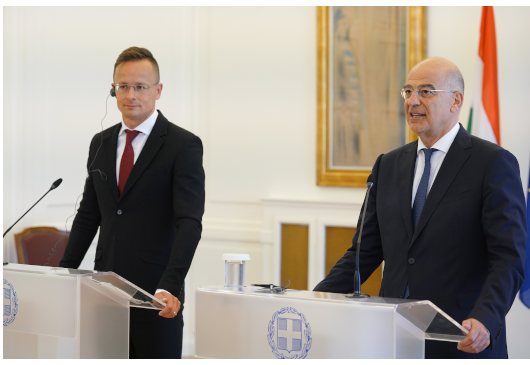 Today, I had the pleasure of welcoming Péter Szijjártó, my Hungarian counterpart, to Athens in the presence of two other Ministers, the Minister of Tourism, Mr Theocharis, and the Minister of Migration, Mr Mitarachi.
Today, I had the pleasure of welcoming Péter Szijjártó, my Hungarian counterpart, to Athens in the presence of two other Ministers, the Minister of Tourism, Mr Theocharis, and the Minister of Migration, Mr Mitarachi.
Peter and I had an interesting discussion on numerous subjects, covering our bilateral political and economic relations, as well as issues concerning the European Union and our own region, that of the Eastern Mediterranean.
Certainly political and economic relations between Hungary and Greece are at a very good level. Of course, as I often say, there is always room for improvement. In the field of investments, in particular, there are great opportunities for investments by Hungarian companies in Greece, while Hungary is also a friendly destination for Greek investments.
We also reviewed the progress of major energy and transport projects of common interest, and agreed on our cooperation and their swifter promotion. Our talks also touched on the railway link between Piraeus and Budapest. I hope, Peter, that we will able to continue this discussion on Corfu in September.
With regard to migration — an issue that you, dear Peter, had the opportunity to discuss with Mr Notis Mitarachi, the Minister of Migration — I had the opportunity today to stress that the impending revision of the common European asylum system must operate on the basis of fair allocation of responsibilities and obligations.
I also had the opportunity to state that Europe, as we all know, is a Union of principles. These principles must be applied both by Member States and by candidate countries. The rule of law, democracy and human rights are synonymous with the Union, and candidates must be well aware of this fact. Therefore, endorsing the foregoing is a prerequisite for acceding to the European Union.
I would also like to state that during the attempt of unlawful entry into Greece that took place this February and March by migrants who were driven in this direction by Turkey, Greece protected the sovereignty and principles of Europe. Turkey's attempt to instrumentalise human pain at the time in order to achieve concessions from Europe failed. Such a tactic is unacceptable not only to Greece but also to the European Union. And I would like to say that Hungary was one of the first partners who sent us support and aid during these incidents, a fact we appreciate greatly — and I thanked the Hungarian Minister for this today.
We also had the opportunity to discuss developments in the Eastern Mediterranean. I explained the actions taken by our neighbour, Turkey, that destabilise our region, as well as the acts against the sovereign rights and sovereignty of Greece and the Republic of Cyprus.
I have repeatedly explained and stated that our red lines have been made absolutely clear to everyone and that any attempt to violate our legitimate rights will be met in an appropriate manner.
I must also repeat the following: Greece is always in favour of dialogue, in favour of reaching an understanding with all states, under one key condition: that this dialogue take place on the basis of rules, the rules of International Law, the rules of the Law of the Sea, the rules of good neighbourly relations. There shall be no dialogue under threats, under extortion, in a climate of daily violations of our sovereignty. One cannot fathom dialogue under these conditions.
I would also like to clarify that the attempt to create unlawful faits accomplis, such as the Turkish-Libyan memorandum, for instance, does not affect the legitimate rights of Greece or any other country. It cannot serve as a negotiating card, let alone as a starting point for negotiations. What is null and unlawful remains as such in perpetuity.
We are well aware of this effort to create faits accomplis, and we do not accept it. Please take note: the fact that we do not and will not accept it must be made clear to anyone who considers that this could serve as a negotiating tactic.
Peter and I also had the opportunity to discuss the impact of the pandemic on our economies, and to discuss measures to mitigate this impact. We also talked about tourism, and we will later have the opportunity to discuss the matter with the Minister of Tourism, Mr Theocharis. Through the Memorandum of Understanding we just signed, we expressed in the clearest possible way our intention to support and protect the large number of tourists that visit both our countries.
We also discussed the Western Balkans and will have the opportunity, hopefully, to continue this discussion on Corfu this autumn.
Finally, we discussed our coordinated actions on issues of common interest, issues of major importance for both Greece and Hungary, issues that concern our regions and other countries in the region, as we have both invested much in its stability.
Dear Peter, I would like to express my warm thanks to you for visiting Athens today. It was my pleasure to welcome you to the Ministry of Foreign Affairs in Athens, Greece.
Thank you very much.
July 9, 2020


